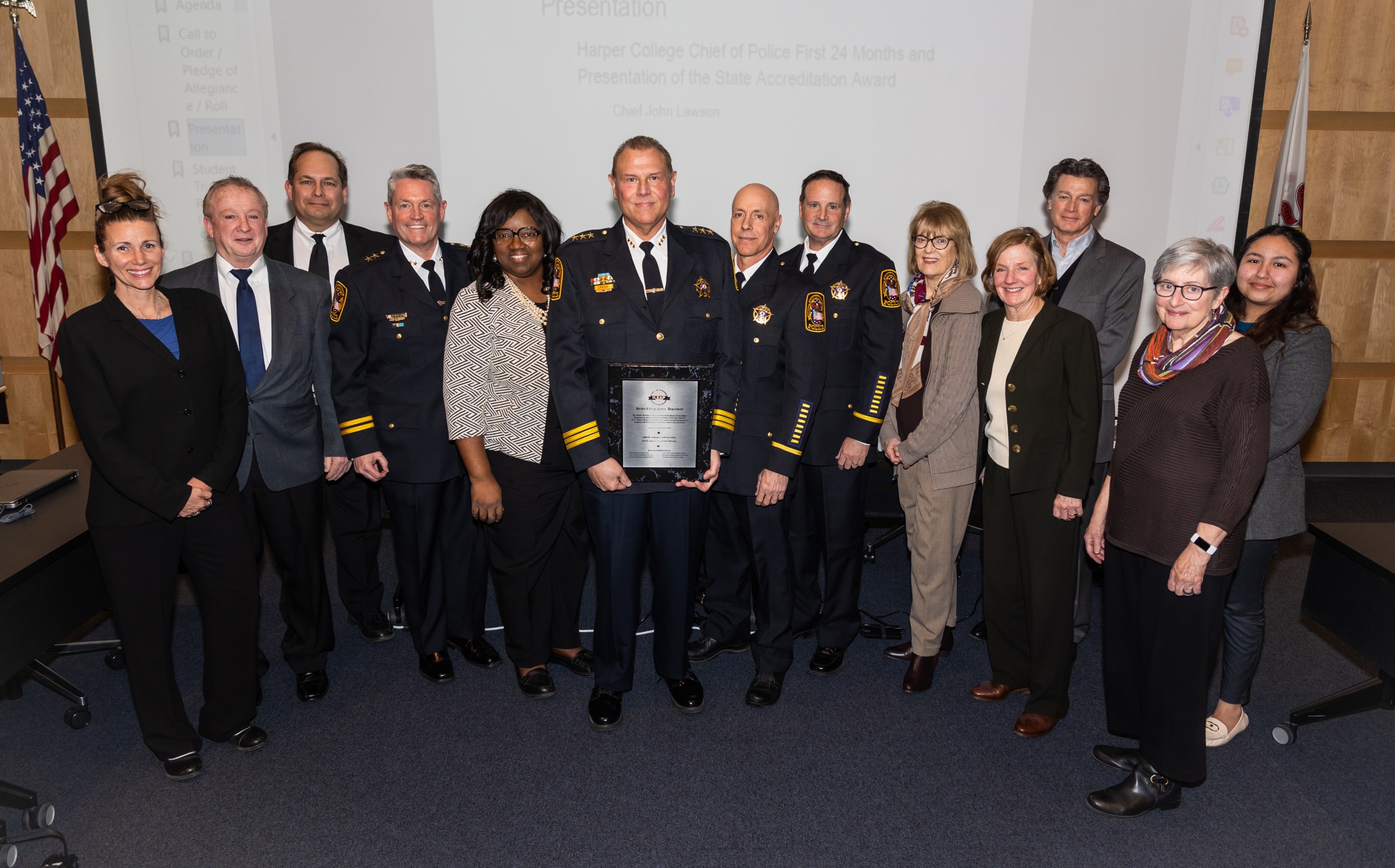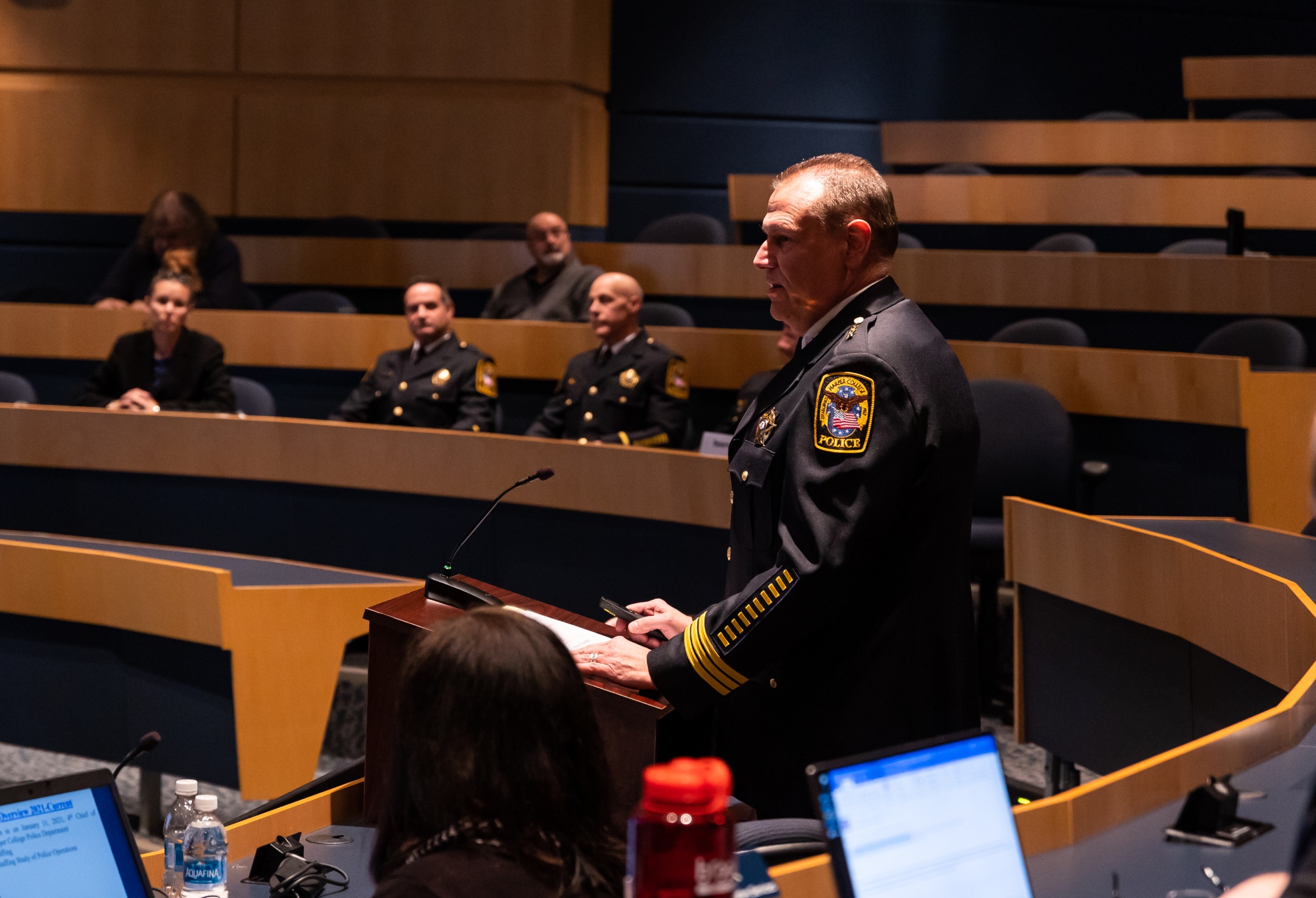
 Harper College is proud to announce the Harper College Police Department has been recognized by the Illinois Law Enforcement Accreditation Program (ILEAP).
Harper’s police force is only the second community college police department in the
state to achieve ILEAP accreditation from the Illinois Association of Chiefs of Police (ILACP).
Harper College is proud to announce the Harper College Police Department has been recognized by the Illinois Law Enforcement Accreditation Program (ILEAP).
Harper’s police force is only the second community college police department in the
state to achieve ILEAP accreditation from the Illinois Association of Chiefs of Police (ILACP).
After the ILEAP Council unanimously approved the department’s accreditation, ILACP First Vice President Dr. Laura L. V. King (and chief of police for the McHenry County Conservation District) presented Harper Police Chief John Lawson with an accreditation plaque during the Harper College Board of Trustees meeting on February 15.
“Accreditation is important because it raises the standards for a department while fostering integrity and accountability,” Lawson said. “Accreditation is designed to be an ‘administrative bulletproof vest.’ It is designed to reduce risk and liability.”
Lawson, a Harper alumnus who has been leading the department for just over two years, made ILEAP accreditation a priority from the moment he applied to be chief. He said that working toward accreditation would take time and funding, but that it would result in a better prepared and equipped police department.
ILEAP assessors combed through Harper Police policies and conducted an on-site assessment to ensure that the department met the 69 standards for tier one accreditation. To confirm that Harper complied with standards involving training, evidence, use of force and more, the assessors examined the department’s facilities, conducted ride- and walk-alongs, and met with officers and department staff. They also sat down with leaders from Harper and its Board of Trustees.
“The ILEAP accreditation achieved by the Harper College Police Department is a testament to the hard work and excellence of the department’s officers, staff and Chief Lawson in maintaining a safe learning environment aligned to ILEAP accreditation standards,” said Dr. Avis Proctor, Harper College president. “Their efforts to gain this accreditation is another example of how we strive to achieve the highest standards of excellence for our students, employees and community.”
Lawson praised Dr. Proctor’s leadership and support for the Harper Police, as well as the assistance the department has received from college administrators and the board. He called the entire accreditation process a team effort – a facet highlighted in the assessment report.
“The strengths of the Harper College Police Department are its chief with his intimate knowledge of the accreditation, a high level of professionalism in the [deputy chief] rank, and departmental engagement with the college, as well as relationships with local area law enforcement,” wrote ILEAP Accreditation Team Leader Jeff Hamer, also a lieutenant in the Macomb Police Department.
 The report spotlighted initiatives the department has taken during Lawson’s tenure,
including joining the Northern Illinois Police Alarm System (NIPAS) Mobile Field Force and Emergency Service Team – SWAT, joining the Major Case Assistance Team (MCAT) Task Force and adopting the 10 Shared Principles of Policing designed by ILCAP and the NAACP.
The report spotlighted initiatives the department has taken during Lawson’s tenure,
including joining the Northern Illinois Police Alarm System (NIPAS) Mobile Field Force and Emergency Service Team – SWAT, joining the Major Case Assistance Team (MCAT) Task Force and adopting the 10 Shared Principles of Policing designed by ILCAP and the NAACP.
Harper’s ILEAP accreditation will be in place for four years before a full reassessment occurs, although Lawson emphasized the continued rigor (including internal inspections and training) required to maintain the department’s status. The chief knows these details well. Prior to his tenure at Harper, he was the accreditation manager at the College of Lake County Police Department (the first Illinois community college to be ILEAP accredited). Lawson has shepherded four departments through the accreditation process.
The chief said that he expects other community college police departments to follow Harper’s example.
“Now that we are accredited, our policies and practices match other accredited departments in big cities from Evanston to Rockford,” Lawson said. “The game plan is to keep doing what we’re doing. We’ve come a long way in a short time.”